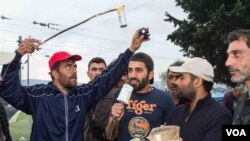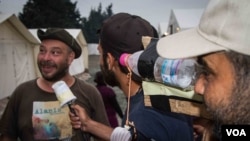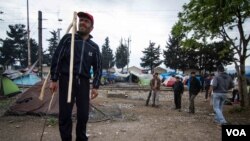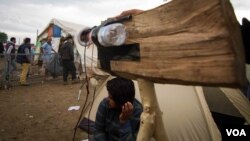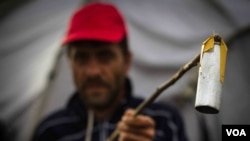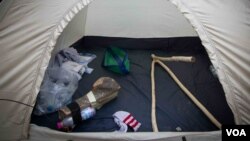It's an all too familiar scene broadcast by mainstream media covering desperate refugees at the Macedonian border - clouds of tear gas fill the air in an attempt by border police to get the protests under control.
But in the hands of a group of Syrian activists seeking to let refugees speak with their own voice, the spent tear gas canisters now take on an entirely new role.
“Journalists come here, they do interviews, they take photos of refugees and then they go back home and show what they want to show,” said Mustafa Alhamoud, who is among those camped out on the Greek side of the border in Idomeni.
At his feet lay the canister, crudely taped to a long stick– or, as he and the rest of the Refugees.tv crew prefer to call it, a microphone.
“What we plan to do is show people what refugees want people to see, and this time we get to decide, not journalists.”
Making do
During the past two weeks, the Refugees.tv crew has roamed around the sprawling expanse of Idomeni camp, gathering stories of those enduring life there.
Lacking access to the equipment used by the press pack that wander among the tents that the refugees must now call home, they have had to improvise.
The team was formed from a young group of Syrians who formed a committee to try and improve things at the camp.
“It was early one morning, and there were no journalists around,” Basel Yatakan, who comes from Damascus, explained.
“There was an empty cup on the ground and the idea just came.”
With the teacup and tear gas cylinder giving the team the two microphones – a hand mic and boom – that any news crew would have, all they needed was a camera.
Yatakan, the group’s cameraman, proudly showed VOA his creation – an unwieldy lump of wood with an empty plastic bottle attached to the side as a lens.
“It’s heavy, and it’s a difficult job,” he added, not entirely seriously.
More real than the real
The man in front of the camera for Refugees.tv is Mahmoud Abdulrahim.
Abdulrahim was studying law before he fled Syria, but has a background in acting, and puts it to good use with deadpan delivery and questioning.
But while the set-up is self-consciously surreal, and often involves turning the questioning on the journalists themselves, the intent behind the comedy is utterly serious.
“We know these interviews are fake, but we ask serious questions, and when we do we get serious answers,” explained Abdulrahim, who explores topics ranging from day-to-day life through to people’s thoughts on U.N. policy and whether they would consider using smugglers.
Fighting the ‘bad image’
Such issues are becoming all the more urgent to those living in Idomeni.
Once just a crossing point into Macedonia, since the borders were closed earlier this spring, it has become home to around 12,000 people.
Recently, frustration has spilled over into skirmishes, culminating in the firing of tear gas and rubber bullets at refugees by Macedonian border police.
The clash involved a tiny minority of the camp but was readily covered by the press, those behind Refugees.tv pointed out, with the everyday reality of the vast majority often neglected.
“Sometimes the journalists just want to show a bad image of refugees,” added Abdulrahim, “and we think that though the camera is fake it can give a more real image.”
Going viral
But now, thanks to the donation of a real camera by a sympathetic volunteer inspired by their efforts, Refugees.tv is able to spread its message beyond the camp.
In the last few days the team started actually recording their videos and interviews and uploading them to their very own Facebook page, which already has more than 3000 'likes'.
Equipped with the real deal, the social-media savvy crew has nonetheless decided to keep their trusty wooden camera.
“It’s about keeping it fun, even if it’s serious,” added Alhamoud, who one day hopes to join his three brothers in Holland.
“People will keep on watching if it’s fun.”
Logistics still a challenge
Setting up a media outlet while living in a refugee camp isn’t easy.
The crew has had no problem gathering footage, whether of tents being blown away in recent severe gales, or a young Syrian girl singing for the Syria she was forced to leave behind.
But with fast Internet in short supply, they’ve had to wait until the small hours of the morning to upload their content.
Meanwhile, the future for all those living at the camp remains deeply uncertain.
Greece wants refugees to move
One of the stories covered in recent days was the Greek authorities handing out letters encouraging refugees to move to state-built camps.
It is a policy being enacted across the country as Greece tries to cope with the reality of 50,000 refugees effectively trapped in the country by the border closure.
But even if they end up leaving Idomeni, Yatakan is adamant that Refugees.tv will not just live on, but thrive.
“Even if we’re moved to other camps by force, we will not stop doing what we’re doing,” he told VOA.
“We’re going to grow this bigger and bigger, and show the positive side of the people here.”




